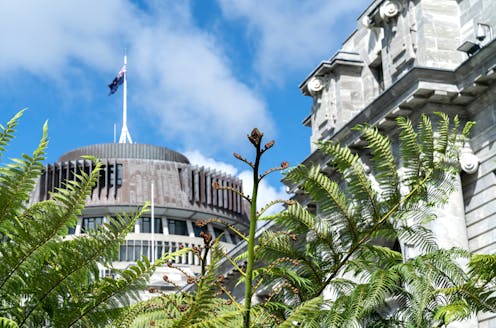here’s where we agree and disagree
- Written by Raven Cretney, Postdoctoral Fellow, Environmental Planning, University of Waikato

Adaptation to climate change will challenge New Zealand politically and economically. As such, it becomes a problem of imagination. We will need to fund things differently, build differently, restructure aspects of our economy, and develop innovative new policies.
As the government launches a new cross-party inquiry[1] into adaptation policy, it will be important to move beyond politics as usual. We’ll need to think creatively about what is politically possible, and better communicate how climate adaptation can benefit different groups.
In 2022, the previous government launched the first National Adaptation Plan (NAP[2]) for consultation. The plan sets out the vision, purpose, goals and priorities for change. It includes a focus on difficult decisions, such as managed retreat[3]. And it establishes the Rauora framework to allow “planning for Māori, by Māori”.
Our new research[4] analysed all 294 public submissions on the NAP. But rather than focus on answers to individual questions (as the government might), we aimed to identify deeper patterns across the entire range of submissions.
By mapping zones of agreement and disagreement among various groups, we can reveal how new coalitions of interest might form to support adaptation policies and actions.
4 imagined futures
Climate change can be a contentious and politically partisan issue. But our analysis identifies promising areas of broad agreement on future action – albeit sometimes for different reasons.
We distill these into four collective themes of “imagined futures”. They represent key areas of alignment that could inform future cross-party considerations on climate adaptation.
1. Data-driven resilience
Almost everyone was supportive of the government increasing investment in science to provide both authoritative national data sets, and more local and culturally specific information.
For the business sector, data helps strategic growth or investment decisions. For nongovernmental organisations (NGOs), it helps understand risks and responses. For communities, it can stimulate the conversations needed for local adaptation.
Data was seen as fundamental to empowering action and monitoring progress, regardless of who took that action. This is crucial – the more people and businesses feel they are able to act now, the lower the potential liability for future governments.
2. Growth and opportunity
This had a strong economic focus, and was characterised by business sector submissions. The more imaginative responses involved climate-resilient construction, regenerative agriculture or digital innovation. Others simply positioned their sector as a crucial part of the solution and called for more economic support.
Perspectives on government regulation varied. Some called for less compliance to allow agility. Others wanted more regulation to create certainty for investment.
While this theme broadly sought to create change within existing political and economic systems, it gives some insight into how private sector interests see the opportunities and value of adaptation action.
3. Nature-society change
There was significant cross-sector support for working with the natural environment.
Strong agreement existed on using nature-based solutions, such as enabling sponge cities[5], to help manage the effects of climate change. Others went further, advocating for restoring the health of ecosystems and enabling biodiversity.
Some submissions from local government emphasised opportunities for linking nature to wider policy goals, such as providing health and amenity benefits, alongside urban densification.
4. Flaxroots transformation
The most radical submissions represented a desire to transform society to tackle the underlying drivers of climate change, including colonisation and the more extractive aspects of capitalism.
This came through strongly in many individual and NGO submissions. These stressed how adaptation is connected to wider societal issues such as political power and resources, and the need to move away from business as usual.
There was a clear call for removing barriers to Māori self-determination and empowering communities to implement local solutions. Many noted there were excellent initiatives, such as zero-waste schemes, already happening.
Political possibilities
There were also areas of disagreement. The most stark involved the scale of required change.
The diagram below represents each of the four themes on a continuum, representing differing degrees of social and political adaptation.
Many – particularly in the business sector – wanted to see adaptation occur within existing economic systems, with new tools, incentives or guidance used to address problems.
This contrasted with those emphasising the need for transformative political change. They saw this as inseparable from addressing broader societal issues such as poverty, inequality or colonisation.
As we move away from the status quo we can see how more transformative futures may require deeper public engagement or stronger political leadership.
Our analysis also showed how the consultation process is skewed. There was strong representation from industry and local government, but significantly fewer submissions from young people or youth organisations.
Some noted the lengthy and technical submission process. Others highlighted the need to go beyond traditional consultation to better involve those on the front lines of climate impacts. This was particularly highlighted by Māori, Pasifika and disabled communities.
Nonetheless, looking across the submissions to identify patterns provides a timely insight into the political possibilities. This will be important if we are to shift away from conventional left-right dynamics and make progress on developing an enduring adaptation policy.
It shows us where differing groups can agree, how we can communicate the policy benefits in different ways to different groups, and where more fundamental disagreement or disengagement will require more thought.
References
- ^ new cross-party inquiry (www.rnz.co.nz)
- ^ NAP (environment.govt.nz)
- ^ managed retreat (theconversation.com)
- ^ new research (www.tandfonline.com)
- ^ sponge cities (theconversation.com)

















